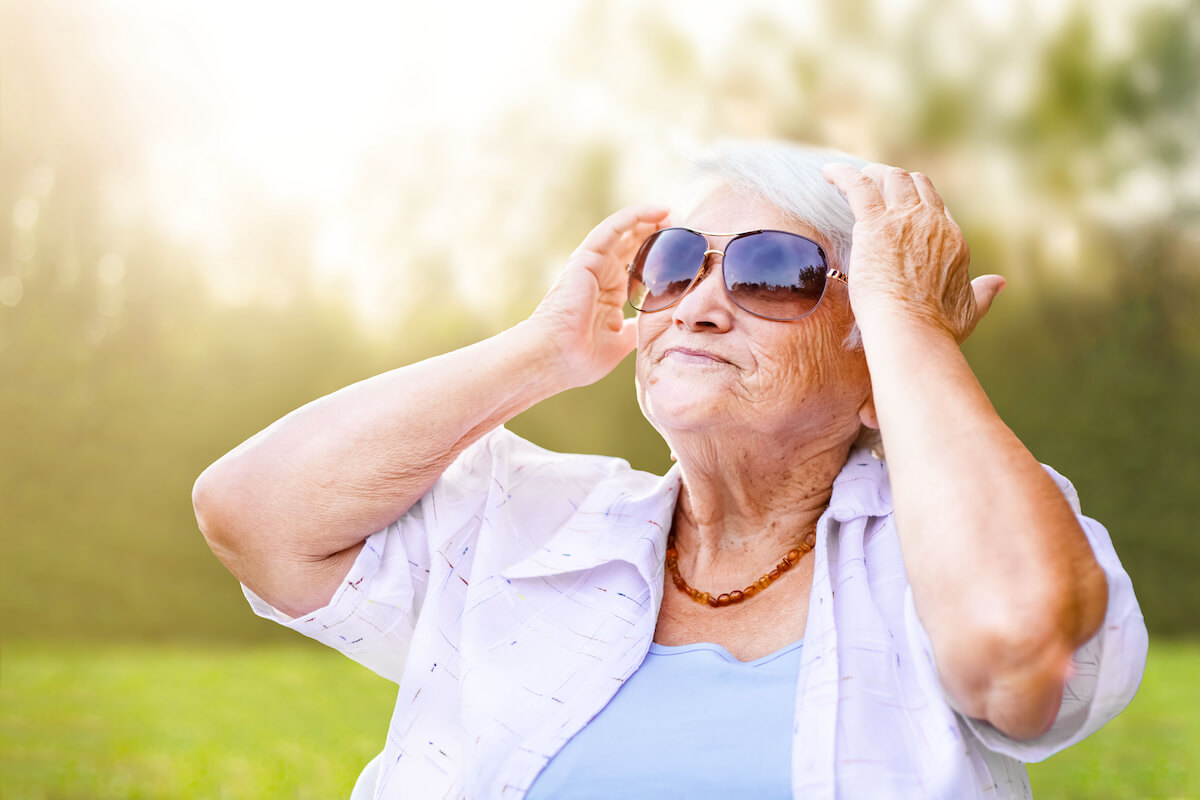
With warm weather upon us, we thought it would be the perfect time to bring up just how important it is to protect your eyes from the sun. Your eyes do age with you, putting your daily activities like driving and reading at risk.
With active senior living communities throughout Canada, Origin Active Lifestyle Communities take a proactive approach to wellness. Start taking your eye health into your own hands by learning how eyes age, the symptoms you should watch out for, and how to protect them.
How Our Eyes Change As We Age
Although our eyes may not always show physical aging, certain functions do change the older we get. Here are some ways you may notice your eyes changing:
Colours: Over time, the cells in our eyes will become less sensitive to colours. This can cause difficulties in noticing differences between certain colours like blue and green.
Eye Disease: An important part of healthy aging and regularly getting check-ups from your eye doctor is to catch certain eye diseases like glaucoma, diabetic retinopathy, presbyopia, cataracts, and macular degeneration early enough.
Light: You know the lag between your eyesight when you enter a dark room on a sunny day? As we age, that lag will become longer and longer, making it harder to transition quickly from varying light levels.
Dryness: The older we get, the fewer tears we produce, increasing irritation and dry eyes.
Pupil Size: Oddly enough, our pupils shrink as our eyes age. Just like a camera, this gives our eyes less of an opportunity to absorb light, meaning we need more light in our senior years.
Reading: It’s common for older individuals to need reading glasses, but did you know this is because our eye lenses become less flexible over time? This makes it more difficult to see text up close.
Symptoms to Be Aware Of
If you’re starting to notice any of the symptoms below, we recommend scheduling an extra eye appointment with your optometrist.
- Excessive or an increased amount of squinting. This can be from nearsighted issues, light sensitivity, or glare sensitivity.
- Increased trips, falls, or running into objects like doorknobs can be a sign of decreased depth perception.
- If you begin to struggle more than normal with spilling food or drinks, it may be a sign that your depth perception is getting worse.
- Having a more challenging time knitting, threading a needle, buttoning a shirt, or grabbing small pieces of food may be a sign your vision is impaired.
- Driving at night can be tough on your eyes, but if it becomes more difficult from headlight glares or lack of contrast between cars, it is very important to speak to your eye doctor.
How To Protect Your Eyes
In today’s world, our eyes are one of our most highly relied-on senses. The trick to preventing eye aging and promoting healthy aging is to be proactive and protect your eyes before issues occur.
No smoking: For certain age-related diseases like macular degeneration, smoking is a significant risk factor.
Always wear sunglasses outdoors: UV rays can damage your eyes even on the cloudiest of days, so it is important to get 99-100% UV-A and UV-B protective sunglasses.
Eye appointments once a year: It is highly recommended to see an eye doctor at least once a year.
Eat a healthy balanced diet: Diabetes is a common precursor for serious eye diseases, so staying on top of a healthy diet will help prevent or manage diabetes.
Use a humidifier: Your eyes need moisture to function properly, so keeping a cool-mist humidifier in your bedroom or around your house will help keep a moist environment.
Wear safety glasses: Safety glasses when working on certain projects can prevent physical injuries, but they can also minimize certain chemical fumes that can damage your eyes, such as ammonia.
Vitamin A: Supplement and eat foods high in vitamin A or beta-carotene to support your cornea and light sensitivity.
Origin Active Lifestyle Communities has active senior living communities throughout western Canada, including Calgary, Canmore, and Vancouver Island. Our communities are dedicated to offering an active and engaging lifestyle for our community members that promote overall health and wellness. We invite you to visit our blog for more articles on healthy aging!




%20-%202025.png?width=500&height=300&name=Origin%20Way%20Blog%20-%20V%20Day%20(3)%20-%202025.png)